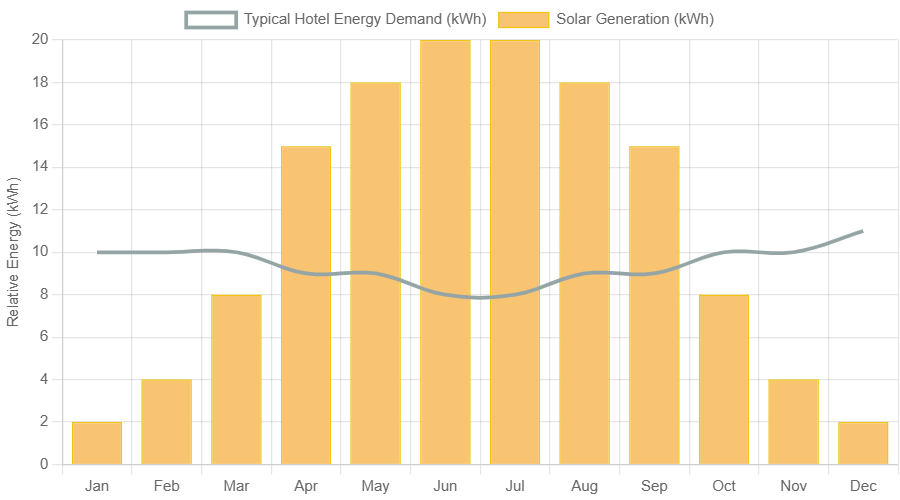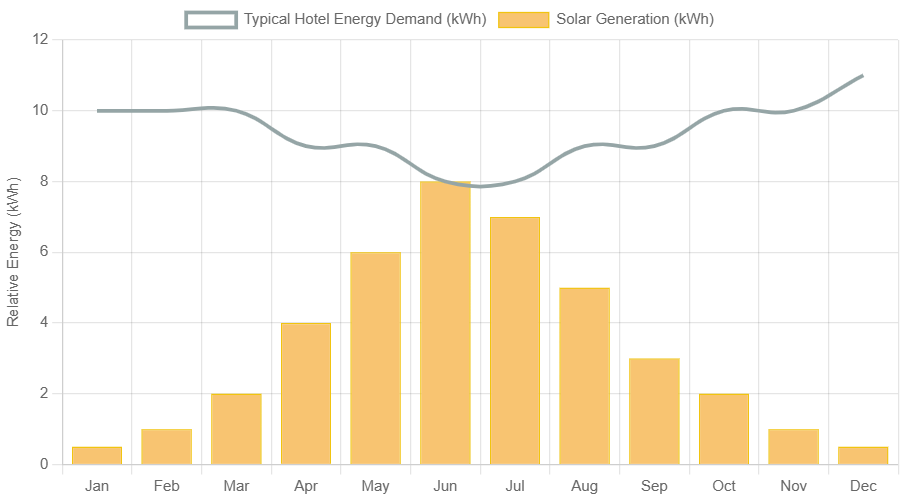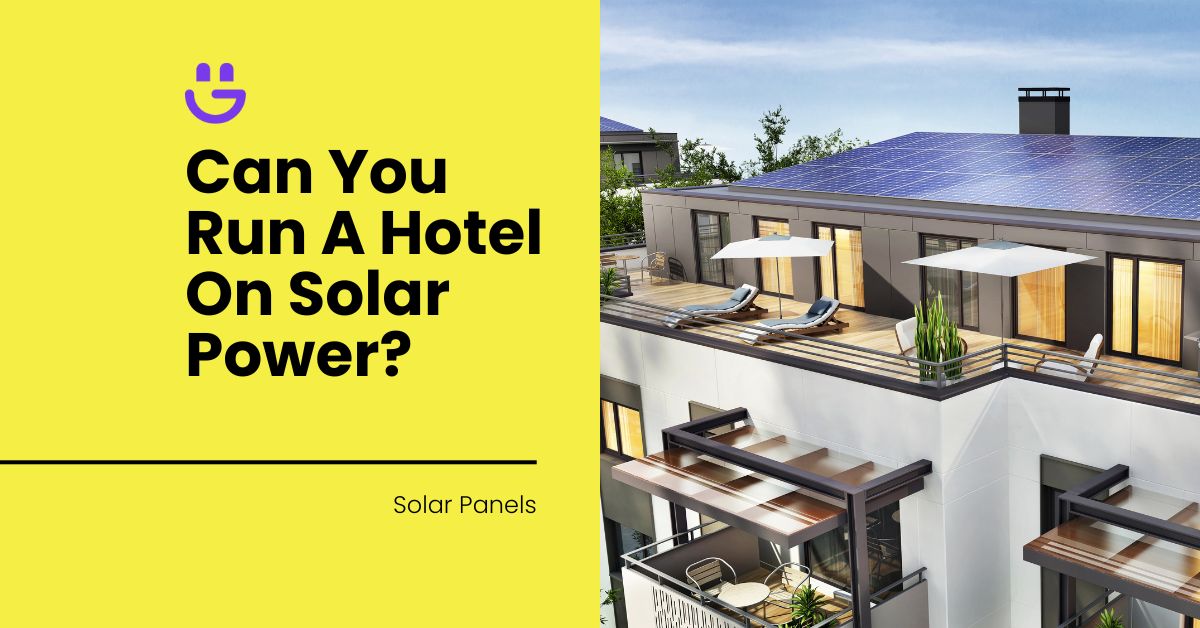Last Updated on November 14, 2025
Many hotel owners ask: Can you run a hotel entirely on solar power? The straightforward answer for a UK hotel operating year-round is: No, not completely off-grid. However, this doesn’t mean solar energy isn’t a game-changer for hospitality businesses in the United Kingdom.
On the contrary, it represents a monumental opportunity for significant cost savings, enhanced sustainability, and greater energy independence. As you read on, we’ll delve into the nuances of solar power for hotels, explaining why a hybrid approach is the most effective and profitable strategy for UK commercial properties.
Contents
- 1 Can Solar Energy Power a Hotel in the UK?
- 2 What Factors Influence Whether a Hotel Can Run on Solar Energy?
- 2.1 Location
- 2.2 South-facing properties
- 2.3 Hotel size and energy demand
- 2.4 Available space for solar panels
- 2.5 Investment in energy efficiency measures
- 2.6 Adoption of battery energy storage systems (BESS)
- 2.7 Connection to the national grid and export opportunities
- 2.8 Maintenance and shading
- 2.9 Panel quality
- 2.10 The change of seasons: summer vs. winter solar output
- 3 How Many Solar Panels Do You Need to Power a Hotel?
- 4 How Much Does a Solar Power System Cost for a Hotel?
- 5 The Proven Hybrid Solution
- 6 Power Your Hotel with Solar Energy – Get Your Free Quote Today!
- 7 FAQs
- 7.1 Does a hotel need planning permission to install solar panels?
- 7.2 What are the benefits of using solar power for a hotel?
- 7.3 Why is the hospitality industry embracing solar energy?
- 7.4 What maintenance is required for a hotel’s solar power system?
- 7.5 What solar panels are most energy efficient for hotels?
- 8 Final Thoughts
Can Solar Energy Power a Hotel in the UK?
For UK hotels trading throughout the year, exclusive reliance on solar power for all energy needs is not currently practical or economically viable. The UK’s climate presents unique challenges, particularly during the winter months, when sunlight hours are significantly reduced.
Despite this, the way solar panels work can and do make a substantial contribution to a hotel’s operations across the entire year.
The focus for sustainable hospitality in the UK shifts from absolute off-grid independence to achieving high levels of energy self-sufficiency and potentially net-zero energy operation through a smart, grid-connected system. This pragmatic view aligns with the realities of renewable energy solutions in a temperate climate.
What Factors Influence Whether a Hotel Can Run on Solar Energy?
Several critical factors determine the extent to which a UK hotel can leverage solar energy systems. Understanding these influences is key to designing an effective commercial solar panel installation.
Location
Some parts of the UK get more sunshine than others. Peak sunshine hours, for maximum solar production are greater in the south. For example, Plymouth enjoys 3 hours of peak sunshine. In comparison, London gets 2.8 hours, Liverpool 2.6, and Edinburgh 2.4. So a Plymouth hotel will generally generate more solar electricity than an Edinburgh establishment.
South-facing properties
Hotels with south-facing roofs or land are most successful at harnessing solar. South-facing orientations capture the most sunlight as the sun moves through its arc. Some hotels use a ground-mounted solar panel system with panels that swivel to track the sun to maximise their solar collection.
Hotel size and energy demand
Larger hotels naturally have greater electricity consumption and heating requirements. A small boutique hotel might achieve a higher percentage of solar self-sufficiency with fewer photovoltaic panels compared to a large chain hotel. Accurate energy audits using half-hourly data are essential to size a solar PV system appropriately.
Understanding your hotel’s energy consumption is the first step. Solar PV systems generate electricity, but a huge portion of a typical hotel’s energy use is for heating and hot water, which is often gas-powered. This highlights why a holistic strategy, including energy efficiency and potentially electrifying heating, is crucial for deep decarbonisation.
Here’s a typical breakdown of a hotel’s energy consumption:
- ~70% Heating & Hot Water: This dominant share often comes from gas, emphasising the need for renewable heating solutions like heat pumps to fully leverage solar electricity.
- 12% Catering: Kitchens and dining areas are significant electricity consumers.
- 8% Lighting: Modern LED lighting can drastically reduce this percentage.
- 10% Other: This includes a variety of electrical loads such as laundry, lifts, and guest room electronics.

Available space for solar panels
The amount of suitable roof space or land for ground-mounted solar arrays directly limits the solar generation capacity. Optimal panel orientation (south-facing) and tilt angle are crucial for maximising solar energy capture throughout the year.
Investment in energy efficiency measures
Reducing overall energy demand through measures like LED lighting upgrades, smart controls, and improved insulation is foundational. The less energy your hotel consumes, the smaller the solar PV system (and battery storage) needed to achieve your sustainability targets.
Adoption of battery energy storage systems (BESS)
Hotel battery storage is a game-changer for maximizing solar self-consumption. It allows excess solar power generated during sunny periods to be stored for use at night or on cloudy days, providing seamless backup power and reducing reliance on the grid during peak tariff times.
Connection to the national grid and export opportunities
A strong connection to the National Grid is vital. It provides a reliable backup energy source during periods of low solar generation and allows hotels to participate in schemes like the Smart Export Guarantee (SEG), turning surplus renewable electricity into a revenue stream.
Maintenance and shading
Keeping your solar panels clean and debris-free and ensuring all connections are sound will help deliver peak performance. Shading should also be minimised. The hotel’s landscaping team may need to cut back trees that cast shade on panels.
Panel quality
Expertly installed solar energy systems with top-quality panels optimise a hotel’s solar yield.
The change of seasons: summer vs. winter solar output
The UK’s seasonal variations in sunlight hours are perhaps the most significant factor. As a solar energy expert would confirm, solar panel performance is dramatically different between summer and winter. In summer, the longer days and higher sun intensity lead to significantly greater solar generation.
Conversely, UK winters bring shorter days, lower sun angles, and often more cloud cover, causing a substantial drop in solar output, typically by 80-90%. This mismatch between consistent hotel energy demand and variable solar supply necessitates a hybrid energy solution.
This section visualises the typical energy demand of a hotel versus its potential solar generation during both summer and winter, highlighting the critical seasonal gap.

Summer months

Winter months
In summer, solar generation (orange) often exceeds the hotel’s typical energy demand (grey), creating a surplus that can be stored in batteries or sold back to the grid.
In winter, generation drops by up to 90%. It falls far short of the hotel’s demand, creating a significant energy deficit that must be covered by battery storage and the National Grid.
How Many Solar Panels Do You Need to Power a Hotel?
The number of solar panels needed to power a hotel varies from under 100 for a boutique hotel to over 1,000 for a larger one.
The property’s energy consumption is the main determinant of panel count. Panel output size in wattage is another key consideration. Panel sizes for hotels vary from around 350 W to 600 W.
Here are approximate guidelines for how many solar panels you’ll need and the space required for different-sized hotels:
| Business size | Annual energy consumption (kWh) | Solar panel system size (kW) | Min. number of solar panels – 450 W | Min. number of solar panels – 600 W | Approx. roof space needed |
|---|---|---|---|---|---|
| Boutique | Under 50 kWh | 50 kW | 112 | 84 | 170 – 250 sq m |
| Small- Mid | 100 kWh | 110 kW | 245 | 184 | 370 – 500 sq m |
| Medium | 300,000 kWh | 330 kW | 734 | 550 | 1,100 – 1,500 sq m |
| Large | 500,000 + kWh | 550+ kW | 1,223+ | 917+ | 1,830 – 2,440+ sq m |
How Much Does a Solar Power System Cost for a Hotel?
The cost of a solar PV system ranges from £50,000 for a boutique hotel to over £500,000 for a large hotel. Most hotels include a battery storage system, allowing you to utilise stored electricity flexibly and efficiently. Batteries cost from £30,000 for boutiques to over £300,000 for large establishments.
While costs range widely depending on brand and technology, here is a guide to approximate costs for solar systems and batteries.
| Hotel size | Solar panel system size (kW) | Estimated cost (including installation) | Estimated battery cost | Total cost with battery |
|---|---|---|---|---|
| Boutique | 50 kW | £50,000 – £72,000 | £40,000 – £50,000 | £90,000 – £122,000 |
| Small-mid | 110 kW | £100,000 – £140,000 | £60,000 – £90,000 | £160,000 – £230,000 |
| Medium | 300 kW | £290,000 – £350,000 | £150,000 – £240,000 | £440,000 – £590,000 |
| Large | 500+ kW | £450,000+ | £275,000 + | £725,000+ |
The Proven Hybrid Solution
Instead of chasing an impractical off-grid ideal, the successful model for UK hotels integrates three key technologies. This section explains how Solar PV, Battery Storage (BESS), and a smart Grid Connection work together to create a resilient, cost-effective, and highly self-sufficient energy system for your commercial property. This approach delivers genuine energy independence within a realistic framework.
1. Solar PV Generation
This is your on-site power plant. A professionally designed solar panel system, sized to your hotel’s specific needs and location, captures solar energy to power your operations during daylight hours. This dramatically reduces your reliance on grid electricity, especially from March to October, when the UK experiences higher solar irradiance. It’s the core of your renewable energy strategy.
2. Battery Storage (BESS)
The game-changer for hotel energy management. Batteries store excess solar energy generated during the day for use at night or on cloudy days. This maximizes self-consumption of your clean energy, provides seamless backup power during grid outages, and helps avoid expensive peak-time grid tariffs. BESS significantly enhances your energy resilience and the overall economic viability of your solar investment.
3. Smart Grid Connection
Your energy safety net and potential revenue stream. The National Grid reliably covers any energy deficit during deep winter months or periods of exceptionally high demand.
Crucially, through schemes like the Smart Export Guarantee (SEG), you can also sell your surplus solar electricity back to the grid, turning your hotel’s roof into a financial asset and contributing to the wider UK energy transition. This grid-interactive system is the key to achieving net-zero aspirations.
Power Your Hotel with Solar Energy – Get Your Free Quote Today!
Are you ready to future-proof your business, slash your hotel’s energy bills, and attract the growing market of environmentally conscious travellers? For the best in solar energy solutions, request a free quote today. Our friendly specialists will get back to you promptly with a quote for a solar panel installation for your hotel – no strings attached.
FAQs
Does a hotel need planning permission to install solar panels?
Installing solar panels generally doesn’t require planning permission because solar installations are considered permitted development.
However, planning permission is necessary for ground-mounted systems larger than 9 sq m and taller than 4 m. If your solar PV system is larger than 50 kW, prior approval from your local planning office may be required to ensure your installation won’t unreasonably impact the local area. Consult the Planning Portal for information about requirements in your area.
What are the benefits of using solar power for a hotel?
The benefits of solar for hotels include major cost savings on reduced electricity bills, a lower carbon footprint, and boosted commercial property value. Using renewable energy can also raise a hotel’s brand image.
Why is the hospitality industry embracing solar energy?
The energy-intensive hospitality industry recognises it must be smart about energy consumption and mitigate rising energy costs. In addition, a growing number of eco-conscious guests and corporate clients prefer to stay at hotels committed to sustainability and reducing their carbon footprint. Unsurprisingly, hotels globally are investing heavily in solar and renewable energy systems.
What maintenance is required for a hotel’s solar power system?
Solar power systems are generally low-maintenance. Cleaning the panels a few times a year is recommended to ensure optimal efficiency. Periodic inspections by a professional are advisable to identify and resolve issues with wiring, inverters, or mounting hardware.
What solar panels are most energy efficient for hotels?
Monocrystalline panels are the most efficient type of solar panel. They are about 50% more efficient at converting sunlight into electricity than cheaper thin-film panels and about 15-20% more efficient than polycrystalline panels.
Final Thoughts
The UK’s dull winter light makes it difficult to run a hotel exclusively on solar power. Hotels usually supplement solar energy by drawing from the National Grid when necessary. While hotels may not rely solely on solar year-round, solar panels significantly reduce energy costs and carbon footprints, especially from March to October.






Tom Allen
Solar Expert